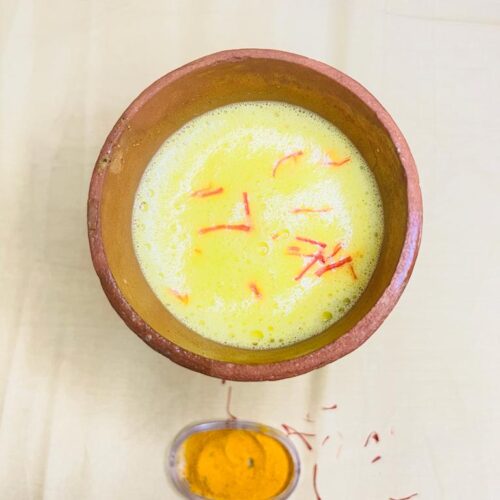Turmeric Milk Recipe Card
Turmeric milk made with turmeric powder and fresh milk which makes it nutritious and yummy to drink.
Equipments
1 Sauce Pan
Ingredients
- 1 cup Milk (whole milk)
- ¼ teaspoon Turmeric powder (ground turmeric)
- A pinch of Black Pepper powder
- ¼ teaspoon Ghee
Instructions
- In a small saucepan, heat 1 cup milk over medium-low heat until it is warm. Be careful not to let it boil.2. Add 1/4 teaspoon ground turmeric to the warm milk. If desired, add a pinch of black pepper to the mixture. Black pepper contains piperine, which can enhance the absorption of curcumin, the active compound in turmeric. These spices not only provide flavor but also offer potential health benefits.3. Now append 1/4 teaspoon ghee in milk. It will boost the energy level and enhance the flavor of milk.4. Whisk the mixture thoroughly to ensure that the spices are evenly distributed and combined with the milk. Continue to heat the mixture for a few more minutes until it is well-infused.5. To give frothy look to milk then exchange itwith2glasses from some height approx 6 inches.6. If you prefer a touch of sweetness, you can add honey or a sweetener of your choice. Stir well until the sweetener is fully dissolved.7. Once everything is well combined, remove the saucepan from the heat.8. Pour the turmeric milk into a cup or mug and enjoy it while it's warm. You can sprinkle a pinch of saffron on top for added flavor and decoration, if desired.Your Turmeric Milk is ready to serve
Video
Notes
- Turmeric milk can be made with dairy milk or plant-based milk alternatives like almond milk, coconut milk, or oat milk.
- It's recommended to prepare turmeric milk fresh whenever possible to retain its flavors and nutritional benefits.
- If storing, turmeric milk can be refrigerated for up to 2 days and reheated gently before consumption.
Nutrition Facts
Turmeric Milk Recipe Card
Amount per Serving
Calories
148
% Daily Value*
Fat
8
g
12
%
Saturated Fat
5
g
31
%
Polyunsaturated Fat
0.3
g
Monounsaturated Fat
2
g
Cholesterol
29
mg
10
%
Sodium
93
mg
4
%
Potassium
380
mg
11
%
Carbohydrates
12
g
4
%
Sugar
12
g
13
%
Fiber
0.1
g
0
%
Protein
8
g
16
%
Vitamin A
396
IU
8
%
Vitamin B1
0.1
mg
7
%
Vitamin B2
0.3
mg
18
%
Vitamin B3
0.3
mg
2
%
Vitamin B6
0.2
mg
10
%
Vitamin B12
1
µg
17
%
Vitamin C
0.1
mg
0
%
Vitamin D
3
µg
20
%
Vitamin E
0.1
mg
1
%
Vitamin K
1
µg
1
%
Calcium
301
mg
30
%
Vitamin B9 (Folate)
0.2
µg
0
%
Iron
0.2
mg
1
%
Magnesium
30
mg
8
%
Phosphorus
248
mg
25
%
Zinc
1
mg
7
%
* Percent Daily Values are based on a 2000 calorie diet.
Tried this recipe?Tag@northindiankitchenn on Instagram
